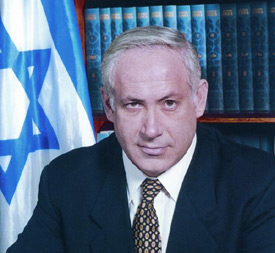Benjamin Netanyahu
|
|
Benjamin Netanyahu (Hebrew בִּנְיָמִין נְתַנְיָהוּ Binyamin Netanyahu, nicknamed Bibi) (born October 21, 1949, Tel Aviv) was the 9th Prime Minister of Israel. A member of the conservative Likud party, he was Prime Minister from April 1996 to May 1999. He is the first (and to date only) Prime Minister of Israel to be born after the creation of the state.
| Contents |
Family and personal background
Benjamin was born to Zila and Ben-Zion Netanyahu. His father, Ben-Zion, is a professor of Jewish History and a former editor of the Hebrew Encyclopedia. His older brother Yonatan is a war hero who was killed during Operation Entebbe in 1976. His younger brother Iddo is a radiologist and writer. All three brothers served in the Sayeret Matkal.
Netanyahu was married twice before, and has a daughter, Noa, from his first marriage. He is married to his third wife, Sarah, and has two children. He grew up in the suburbs of Philadelphia, Pennsylvania, and graduated from Cheltenham High School. He holds a BS in Architecture from the Massachusetts Institute of Technology and a MS in Management from the MIT Sloan School of Management, and has studied political science at Harvard and MIT. His IQ has been approximated to be as high as 180.
Prime minister (1996-1999)
Netanyahu was elected in 1996 after a wave of Palestinian suicide attacks on Israeli civilians. Shimon Peres, who was favored in the polls, could not stop the terror attacks and public faith in him decreased rapidly. On March 3 and 4 1996, Palestinian terrorists carried out two lethal suicide bombings in which 32 Israeli citizens were killed. Those two attacks were the main catalyst in the downfall of Peres, who eventually lost the election due to his inability to stop terrorism against Israelis. Unlike Peres, Netanyahu did not trust Yasser Arafat's good will and conditioned any progress at the peace process on the Palestinian Authority fulfilling their obligations - mainly fighting terrorism. His campaign slogan was "Netanyahu - making a safe Peace".
Perhaps due to his American education, Nentanyahu hired American right-wing politican operative Arthur Finkelstein to run his campaign. Although the American style of sound bytes and sharp attacks elicited harsh criticism from inside Israel, it proved effective and Netanyahu's Likud Party took control. In 1999 Ehud Barak would choose a similar style to challenge Netanyahu by bringing in Bill Clinton's former campaign manager, James Carville as well as American consultant Bob Shrum and pollster Stanley Greenberg.
As Prime Minister he negotiated with Yasser Arafat in the form of the Wye accords, but many claimed he tried to stall any progress. Netanyahu's approach to the peace negotiations was popular:
- "If they'll give - they'll get. If they won't give - they won't get".
- "יתנו - יקבלו. לא יתנו - לא יקבלו"
This approach seemed to work; unlike the rule of his predecessors and successors, Netanyahu's rule was quieter with relatively few Palestinian suicide bombings within Israel. In 1996, Netanyahu and Jerusalem's mayor Ehud Olmert decided to open an exit for the Western Wall tunnel. This sparked three days of riots by Palestinians, resulting in about dozen Israeli and hundred Palestinians killed.
Despite his progress against terrorism, Netanyahu was hated by most of the elites and the media who are identified with the left-wing in Israel. After a long chain of scandals (including gossip over his wife) and an investigation opened against him on charges of corruption, Netanyahu lost favor with the Israeli public.
After being defeated by Ehud Barak in the 1999 Israeli general elections, Netanyahu temporarily retired from politics.
Political activity after 2000
In 2002 after the Israeli Labor party left power and vacated the position of foreign minister, Prime Minister Ariel Sharon appointed Netanyahu as Foreign Minister. Netanyahu challenged Sharon for the leadership of the Likud party but failed to oust Sharon. After the 2003 elections, Netanyahu accepted the post of Finance Minister in a newly formed Sharon coalition. Netanyahu does not currently support the concept of a future Palestinian state, though on two occasions in 2001, he indicated willingness to consider the idea "Likud Central Committee Rejects Palestinian State" (Haaretz Daily, 13MAY2002) (http://www.haaretzdaily.com/hasen/pages/ShArt.jhtml?itemNo=162720&contrassID=1&subContrassID=0&sbSubContrassID=0).
As a Finance Minister, Netanyahu undertook a bold economic plan in order to restore Israel's economy from its low during the al-Aqsa Intifada. The plan involved a move towards more liberalised markets, although it has been seen by many opponents as controversial.
Books and articles
Books:
- A Durable Peace: Israel and Its Place Among the Nations (Warner Books, 2000) ISBN 0446523062
- Fighting Terrorism: How Democracies Can Defeat Domestic And International Terrorism (Diane Pub Co, 1995) ISBN 0788155148
- A Place Among the Nations (Bantam, 1993) ISBN 0553089749
- Terrorism: How the West Can Win (Farrar Straus & Giroux, 1986) ISBN 0374273421
Articles:
- "On Terrorism" (http://www.netanyahu.org/statofforisp.html)
External links
- Website of supporters of Benjamin Netanyahu: Hebrew (http://www.netanyahu.org/index.html) English (http://dinafisher.com/netanyahu/)
- Benjamin Netanyahu on the definition of terror (http://news.bbc.co.uk/olmedia/1630000/video/_1631740_mideast_netanyahu06_vi.ram) (BBC)(5 min.)
| Preceded by : Shimon Peres |
Prime Ministers of Israel | Succeeded by: Ehud Barak |
bg:Бенямин Нетаняху de:Benjamin Netanjahu eo:Binjamin NETANJAHU fr:Benyamin Netanyahou id:Benjamin Netanyahu he:בנימין נתניהו ja:ベンヤミン・ネタニヤフ nl:Benjamin Netanyahu

